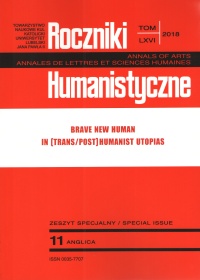The Ultimate Post-humanist Nostalgia in the TV Show Being Human US: Monstrous Home as an Allegory of the Human
Abstrakt
Granice post-humanistycznej nostalgii w serialu telewizyjnym pt. Być człowiekiem. Wersja amerykańska: Potworny dom jako alegoria człowieka
Artykuł dyskutuje napięcie występujące między humanistyczną a post-humanistyczną perspektywą przedstawienia domu stworzonego przez hybrydyczne potwory w serialu telewiuzyjnym pt. Być człowiekiem, wersja amerykańska: ducha, wampira, oraz parę wilkołaków. Niesamowity dom postrzegany jest jako palimpsest przestrzeni architektonicznej i symbolicznej, a współistnienie monstrów daje asumpt do wyłonienia się alegorycznego modelu człowieka; modelu, który nie bez nostalgii za humanistyczną przeszłością, zapowiada utopijną wizję przyszłego post-humanistycznego świata. Żyjąc we wspólnocie, duch, wampir i para wilkołaków funkcjonują jako asemblaż dramatyzujący humanistyczną koncepcję tego, czym jest człowiek. Jednak człowieczeństwo, którego poszukują bohaterowie serialu badane jest z perspektywy krytycznego post-humanizmu, opierającego się na pojęciu post-człowieka przywołującym i transformującym pytanie o to, co to znaczy być człowiekiem i w jaki sposób człowieczeństwo może być krytycznie ocenione i przekroczone w kierunku jeszcze nie zrealizowanej utopii. Krytyczny post-humanizm propaguje całkowicie nowe, post-gatunkowe, post-animistyczne, oraz post-globalne (tzn. kosmiczne) sposoby zamieszkiwania świata. Chwilowo zrealizowana utopia współistnienia potworów stanowi dowód na to, że utopijny post-humanistyczny model człowieka może funkcjonować, ale po warunkiem, że “nieczystość” post-humanistycznych stworzeń zostanie użyta do zdefiniowania post-humanistycznego człowieka — człowieka, który jest potworem.
Bibliografia
Badmington, Neil. Alien Chic: Posthumanism and the Other Within. London: Routledge, 2004. Print.
Bammer, Angelika. Partial Visions: Feminism and Utopianism in the 1970s. London: Routledge, 1991. Print.
Being Human US. Muse Entertainment Enterprises, 2011–2014. TV.
Belsey, Catherine. Critical Practice. London: Methuen, 1980. Print.
Boym, Svetlana. The Future of Nostalgia. New York: Basic Books, 2001. Print.
Calarco, Matthew. “Boundary Issues: Human-Animal Relationships in Karen Joy Fowler’s We are All Completely besides Ourselves.” Modern Fiction Studies 60.3 (2014): 616–635. Print.
Clarke, Bruce. Posthuman Metamorphosis: Narrative and Systems. New York: Fordham University Press, 2008. Print.
Costantini, Mariaconctta. “Crossing Boundaries: the Revision of the Gothic Paradigms in Heat and Dust.” Empire and the Gothic: The Politics of Genre. Ed. Andrew Smith and William Hughes. 155–171. Print.
Girard, René. Violence and the Sacred. Trans. Patrick Gregory. Baltimore: Johns Hopkins University Press, 1977. Print.
Greene, Richard. “The Badness of Undeath.” Zombies, Vampires and Philosophy. Ed. Richard Greene and K. Silem Mohammad. Chicago: Open Court, 2010. Ebook.
Hanssen, Beatrice. Walter Benjamin’s Other History: Of Stones, Animals, Human Beings, and Angels. Berkeley: University of California Press, 1998. Print.
Herbrechter, Stefan. Posthumanism: A Critical Analysis. London: Bloomsbury, 2013. Print.
Kelley, Theresa M. Reinventing Allegory. Cambridge: Cambridge University Press, 1997. Print.
Latour, Bruno. We Have Never Been Modern. Trans. Catherine Porter. Cambridge: Harvard University Press, 1993. Print.
Leeder, Murray. “Introduction.” Cinematic Ghosts: Haunting and Spectrality from Silent Cinema to the Digital Era. New York: Bloomsbury Academic, 2015. 1–14. Print.
Levitas, Ruth. Utopia As Method: The Imaginary Reconstitution of Society. Basingstoke: Palgrave Macmillan, 2013. Print.
Nelson, Victoria. Gothicka: Vampire Heroes, Human Gods, and the New Supernatural. Cambridge: Harvard University Press, 2012. Print.
Unger, Roberto Mangabeira. The Self Awakened: Pragmatism Unbound. Cambridge: Harvard University Press, 2007. Print.
Wells, H.G. A Modern Utopia. 1905. Auckland: The Floating Press, 2009. Print.
Wind, Jessica. Your Friendly Neighbourhood Zombie: Normalizing Monstrous Bodies Through Zombie Media. MA Thesis. Carleton University, 2016. Online. Web.
Copyright (c) 2018 Roczniki Humanistyczne

Utwór dostępny jest na licencji Creative Commons Uznanie autorstwa – Użycie niekomercyjne – Bez utworów zależnych 4.0 Międzynarodowe.





